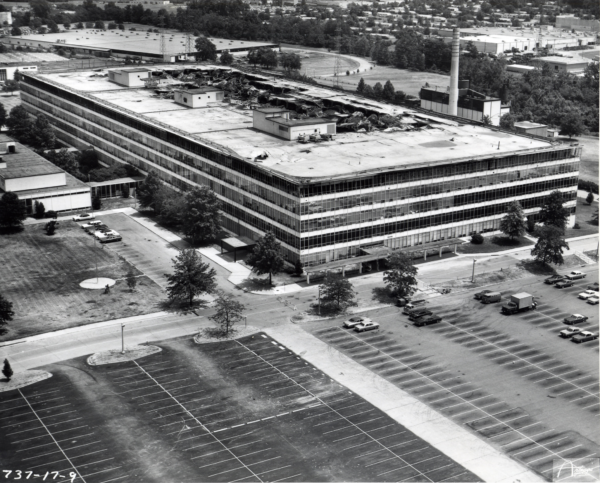
Roof Damage Following the 1973 Fire at the Military Personnel Records Center in St. Louis, Missouri (Photo: National Archives at College Park – Still Pictures)
In the early hours on July 12, 1973, a fire engulfed the sixth floor of The National Personnel Records Center, Military Personnel Records (NPRC-MPR) in St. Louis, Missouri, resulting in the destruction of an estimated 16 to 18 million Veterans’ records.
The fire, which resulted in the largest loss of records in U.S. history due to a single event, has had a profound impact on Veterans and their families. The records affected were primarily from the period just before World War I through 1963, encompassing the official military personnel files of countless Veterans.
Files were lost from every branch of the service, but the most damage was to the Army and Air Force records. Approximately 80% of Army personnel files for individuals discharged between November 1, 1912, to January 1, 1960, were destroyed by the fire. Similarly, it is estimated that 75% of Air Force personnel files for those discharged between September 25, 1947, and January 1, 1964, whose names started after “Hubbard, James,” were lost in the fire.
Decades later, the search for answers and the struggle to reclaim lost histories persists. The records serve as an account of a Veteran’s service, detailing duty stations, awards, promotions, and disciplinary actions. They are essential for accessing benefits, medical care, insurance, and employment opportunities. Families continue to struggle in their attempts to document the achievements and sacrifices of their loved ones or to honor them with full military honors. The loss of these records has compelled Veterans and their families to wage a renewed battle for recognition and the benefits they rightfully earned.
Prior to the fire, a government study had identified the facility as high-risk due to factors such as storage containers made of cardboard instead of metal, the absence of overhead sprinklers in the record stacks, and fluctuating employee work hours. Despite these warnings, the tragedy unfolded, leaving the janitors and firefighters to face the monumental task of containing the fire and minimizing further damage.
The fire burned intensely for 22 hours, resulting in severe structural damage. Steel-reinforced concrete columns on the sixth floor buckled, and portions of the collapsed roof were supported solely by file cabinets. Firefighters doused the building with large amounts of water, and at times, bulldozers were used to remove debris from the upper floors. The fire was not fully extinguished until four days later, on July 16.
Investigating the cause of the fire presented a difficult challenge. Prior to the fire, there had been several small fires, some suspected to be arson. The FBI pursued various leads and probed into workers’ political sentiments regarding the Vietnam War. Eventually, attention shifted to a custodian who claimed he might have accidentally started the fire while smoking on the sixth floor. However, a federal grand jury chose not to indict him, and an exact cause for the fire could not be conclusively determined.
The repercussions of the fire prompted the NPRC to undertake extensive recovery and reconstruction efforts. Approximately 6.5 million heavily damaged files were salvaged and stored in climate-controlled warehouses to prevent further deterioration. Technicians used innovative methods, such as infrared cameras, to reveal the hidden information beneath the charred pages. Research technicians meticulously combed through alternative sources and official government records to reconstruct lost files, aiming to provide Veterans with the necessary documentation to access benefits.
While progress has been made in partially reconstructing around 5.5 million records, the impact of the fire remains a painful obstacle for historians and family genealogists striving to piece together the histories of Veterans whose records were lost. The search for answers continues, driven by the desire to honor and remember those who served.













